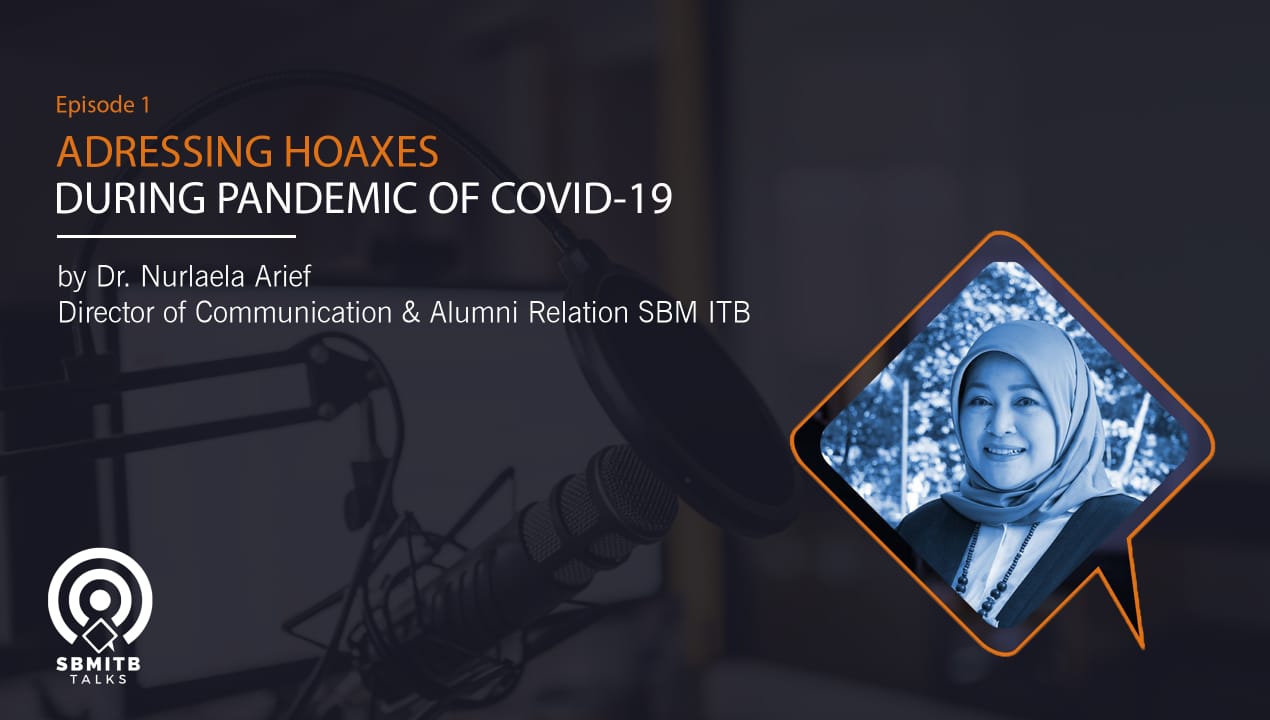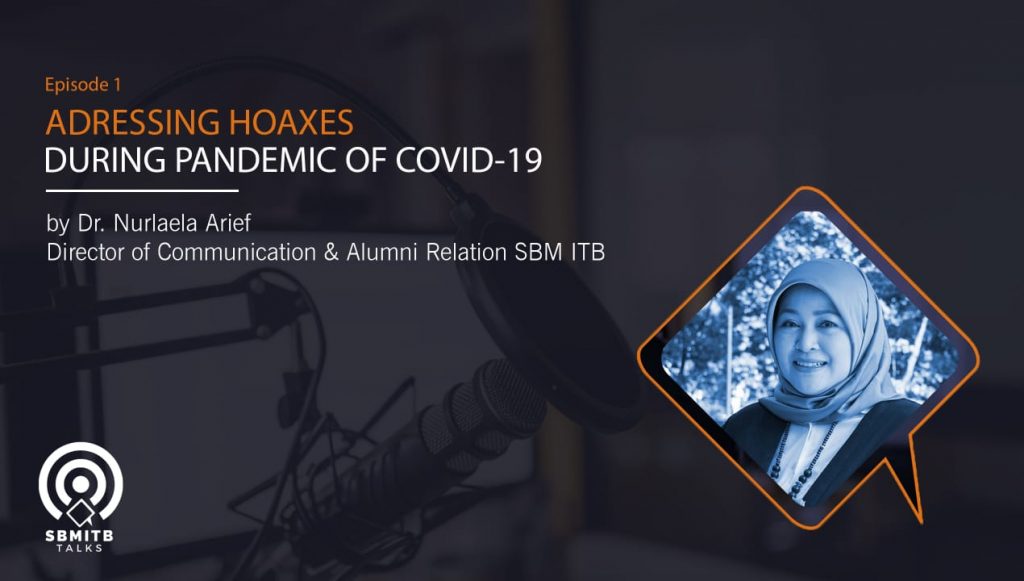People are demanded to stay at home, and eventually, they spend more time with their gadgets, making them exposed to information, often with hoaxes in them. How is Mrs. Nurlaela Arief responding to hoaxes and too much information circulating?

Evita : Hello everyone, welcome to SBM ITB Talks.
Evita : Today we will talk about the hoaxes about the coronavirus and how to against it. For today’s topic, we have Mrs. Nurlaela Arief, she is director of marketing communication SBM ITB and previously she has become head of the Communication Department in PT Biofarma. Mrs. Lala has also researched the complexity of vaccine communication in Indonesia, especially about pro-vaccine vs anti-vaccine communication strategy. So, if you guys are curious, stick around and listen to us!
Evita : hello Mrs. Lala
Mrs. Lala : Hello, good Morning SBM ITB friends, hope you always healthy.
Evita : So, Mrs. Lala today I will ask you several questions to discuss. The first question, What’s your opinion about the spread of information about Corona Virus in public as we see, there are so much news about this issue in social media, newspaper, television, and most in WhatsApp Group and another instant messaging app.
Mrs. Lala : Okay, on these several days, many people campaigning about social distancing. And then there are some campaigns like hashtag and discourse that encourage us to do social distancing in social media. I think this idea born as the consequence of too much information whether from social media, WhatsApp group, even television, especially about the COVID-19. There are people that even limiting themselves selves in consuming media including checking their WhatsApp. In fact, the information about COVID-19 is booming make people confused either the information is real or not, is it correct to forward the information they’ve got, and worst this issue at the end affects the public mentally.
Evita : and then we know about the panic buying phenomenon, people tend to do panic shopping, what is your opinion about this phenomenon, is it one of the people’s reactions from hoax information about the Coronavirus?
Mrs. Lala : If we look closer, this panic buying is also because of too much information, you know like we get video from WhatsApp group that shows people queueing in the cashier with so many basic needs with them then they stockpile their basic needs in their home but the truth is some of the videos are taken when holiday period and if we go to the supermarket there wasn’t panic buying. So, the fact is, in this situation people tend to buy government-recommended needs related to COVID-19 like masks, hand sanitizer, disinfectant, and some vitamin and for basic needs, there is still a lot of stock. Back again it’s about how we receive the message. About this situation, the government is also trying to balance this information which does not know its source with other valid information to help us know if the panic buying phenomenon is fact or hoax.
Evita : Actually how dangerous is this hoax about health in the midst of society?
Mrs. Lala : If we look at the world data about the hoax, the last research shows that in Europe 45% of the news in social media is fake news that we called hoax in Indonesia. That fake news or hoax even distributed until 450.000 times in social media. how about Indonesia? In Indonesia, 5 issues are the most widely spread throughout 2017 until 2019 those are politics, ethnicity, race, religion, and health and to answer your question, “how dangerous is this hoax?” Health issue somehow is a sexy issue, so if people hear hoax about health they’ll react more either forward or keep the information and try to protect their selves from another similar information, it depends on the person. But the important thing is the fact that health issue is the most falsified information topic, not only in Indonesia but also in the world. Of course, these days, some platforms are already Exist like in ITB, I’ve heard that STEI ITB has made an app named Hoax Analyzer. Ministry of Communication and Informatics has also launched several platforms to check if the news is a fact or fake. But sure, it’s not that easy to detect fake news, we as humans have to use our logic and think, “Is this information real or fake?” and prove it by googling it and find reliable sources of information.
Evita : Technology advances make us exposed by hoax easier because everything is instant and easy, so what are the ways we can do to avoid the influences of hoaxes?
Mrs. Lala : Well, this is interesting, lately, I read a book titled ’Everybody Lie’. From this book I know, moreover in social media, people tend to lie to cover or keep our image good. For example, a wife told, “My husband is very handsome and romantic”, but the fact, he is not like that. We can say that now live in the post-truth era, some fake information that delivered continuously somehow will be considered right by the community moreover the correct information can be defeated by this fake news. How can we protect ourselves from this condition? Back again, we cannot depend on government only but we also have to make effort, we as a college, professional organization, even we as a community have to campaign our ideas about this, it means we offset fake information that already accepted by the public with factual information.
Evita : What kind of communication pattern the public need to avoid Hoaxes about Corona Virus and are there other ways the government can do to control the negative issues that spread so fast?
Mrs. Lala : If we look at the government action about this issue, the government has appointed their spokesperson to deliver updated information especially about COVID-19. Appointing spokesperson is one of the government’s efforts to build one gate communication so that not every person can give information to the public but only the person who is credible can deliver the information. Other than that, the government also appointed some professionals who are experts in the COVID-19 issue. With this way of communication, not everybody is allowed to deliver information so only credible information will be received by the public. We also do one gate communication in SBM ITB, we know that there is some WhatsApp group for the lecturer and also the professional staff. When we delivered some information, usually other people will give a reaction, either asking a question or give information they know, can you imagine how crowded is this WhatsApp group if there are more than 200 accounts in there, the main information can be struck down by new information. So, SBM decided to make one special WhatsApp group that only filled by division representatives in SBM and only people that have authority like Dean, Vice Dean, and Head of the Study Program who can deliver information to make one gate communication. This is one of the ways SBM has made to convey information about health policies and protocols to make the delivery more organized.
Evita : One of the government’s efforts to avoid the Coronavirus is doing social distancing, but until this time there are several groups of people that don’t consider this case as an urgent matter yet. They still move outside their house although their work can be done at home. In your opinion, is this related to the lack of effectiveness of the government’s appeal to the community?
Mrs. Lala : So back again, why even though the government has said to stay at home, there is still a group of people that doing activities that involve large numbers of people like a wedding party or another event similar to that. We can see it does not only depend on the effectiveness of communication but also the complexity of Indonesia’s society that makes visual communication like an article or some content in social media isn’t enough. We need direct communication, the old fashion one. We have to empower opinion leaders like community and religious leaders. Even now, we can see from social media and mass media there are some video shows how civil service police unit and Indonesia’s Soldier that intervened to stop the parties.
Evita : What kind of action that we as students can do to succeed the government program against the hoaxes of Corona Virus? What is your opinion, Mrs. Lala?
Mrs. Lala : For students, now you are encouraged to stay at home and do online courses. We know that online lectures are still new to us so many students complain because there are so many home works they have to finish. But in this situation, as students it’s better to prepare yourselves before the courses, you can learn the material that has been given previously by your lecturer so that when the online courses held you already have enough insight and can explore more, also you can finish the homework easier. We — your lecturer, also hope for face to face meetings because we can learn more things from friends, lecturers, and student interaction, and from the campus ecosystem. For our students please be more patient, be more resilient because we know these online courses, online lectures are quite difficult to do moreover because of the burden of college and a lot of assignments.
Evita : Okay, I think that’s all our discussion for today, thank you, Mrs. Lala, for your time.
Mrs. Lala : Yeah, thank you, Evita and SBM friends. See you at the next discussion.
Evita and Mrs. Lala : SBM, For the Greater Good
Evita : Online Info Session. At this event, each director of the study program will explain about their Masters and Doctoral programs. So, for those of you who might graduate from undergraduate but are still confused about wanting to continue their studies or go straight to work and also for those of you who might have worked but still want to add research skills and management knowledge, don’t miss this event! Check the date and register now! The link is available in the description box below. Okay, maybe that’s all for our podcast today, thanks friends for watching. Don’t forget to like and comment on your way of responding hoaxes, Bye!





